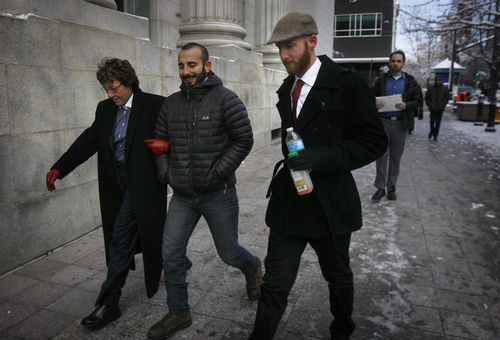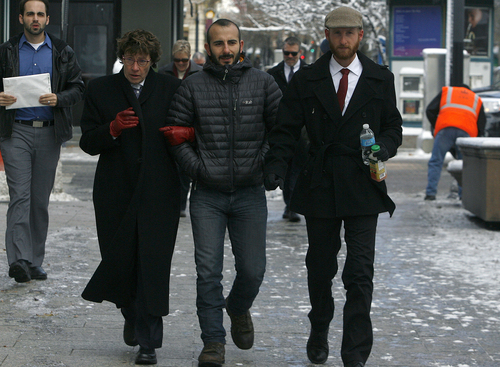This is an archived article that was published on sltrib.com in 2013, and information in the article may be outdated. It is provided only for personal research purposes and may not be reprinted.
A federal judge will hear arguments Wednesday in a lawsuit challenging Utah's ban on same-sex marriage brought by three couples who contend the prohibition is unconstitutional.
Each side has asked U.S. District Court Judge Robert J. Shelby for summary judgment — that is, to find based on lack of disputed facts and existing law that there is no need for what would likely be a protracted legal fight over Utah's Amendment 3, the ban approved by voters in 2004.
The plaintiffs in the lawsuit are: Derek L. Kitchen and Moudi D. Sbeity; Laurie Wood and Kody Partridge; and Karen Archer and Kate Call. They filed the lawsuit in March, just as the U.S. Supreme Court heard arguments in two different cases involving the constitutionality of laws on same-sex marriage and associated rights.
In a pair of rulings issued three months later, the Supreme Court dismissed on procedural grounds a challenge of a lower court decision overturning a ban on same-sex marriage in California and struck down a key element of the federal Defense of Marriage Act (DOMA), which denied federal benefits to same-sex couples, even in states like New Yorkwhere such marriages are legal.
In the Utah lawsuit, both sides use the ruling in the second case — United States v. Windsor — to argue that Shelby should find in their favor.
Attorneys for Utah say Windsor makes clear that states, not the federal government, have sovereign authority to define and regulate marriage. The Windsor ruling is "replete with deferential references" to the state of New York's power and authority to regulate marriage, state attorneys argue, and criticizes the federal government's effort to interfere with such decisions.
Windsor "overturned an act of Congress considered an 'unusual' federal intrusion" into state authority. Given that, Utah's own power, decision-making and "exercise of its sovereign authority within our federal system to not include same-sex marriage is entitled to the same respect and deference," the state argues.
Attorneys for the three couples say that under the "binding analysis" of Windsor, their arguments prevail because "Utah's Marriage Discrimination Laws ... single out same-sex couples to impose a disability on them, and to treat them unequally." Under Windsor, such laws are "irrational, and no legitimate purpose overcomes their purpose and effect to disparage and injure."
"In arguing that regulation of marriage is the exclusive province of the state, the state defendants rely on antiquated opinions and case law, and ignore the patent statements in Windsor to the contrary," the couples argue. Moreover, the state defendants "gloss over" statements in the decision that highlight the need to "respect the constitutional rights of persons" in marriage laws and misinterpret the basis for striking down DOMA, which was equal protection and due process — not federalism.
"Where a state's regulation of marriage does not respect those rights, or infringes upon those guarantees — such as the case here — then the state's power is limited by the Constitution," the plaintiffs argue.
The plaintiffs and the state disagree about the standard of scrutiny that should be the basis of weighing the constitutionality of Utah's law, as well as what research has to say about same-sex relationships — particularly regarding children raised by such couples.
The ACLU of Utah, in an amicus brief filed in support of the plaintiffs, urges Shelby to use heightened scrutiny in his review of Utah's law, which would mean homosexual couples would be considered a quasi-suspect class that has historically experienced discrimination, has distinguishing and immutable characteristics and is politically powerless.
The state counters that the 10th Circuit Court of Appeals has found sexual orientation is not a protected class deserving of the higher standard of scrutiny, instead requiring a review based on whether there is a rational governmental interest underlying Utah law.
"Viewed properly, none of the factors adequately supports — and the important political power factor weighs heavily against — making sexual orientation the first new protected class in almost 40 years," the state says in a court filing.
Gay and lesbian interest groups have made remarkable advances in legal and political arenas, with 16 states and the District of Columbia now recognizing same-sex marriage, the state notes. A majority of Americans also support such marriages, it adds.
"It would be hard to identify many groups on the national scene that are more politically powerful than gays and lesbians," the state says.
Homosexuality also is "directly relevant to marriage's historical focus on childbearing and mother-father child-rearing and to the problem of unplanned and unintended children," the state argues. "Male-female marriage supports the state's strong interest in having a child raised by the father and mother who brought him into the world; same-sex marriage does not."
The state also says that if the term "marriage" is extended to relationships other than those involving a man and a woman it will lose "some of its intelligibility" and thus "some of its power to attract broad social allegiance and support and to guide potentially procreative heterosexual couples into stable marriages."
But the plaintiffs argue that the state "cannot use their political power to discriminate against a politically unpopular minority that does not share the majority's religious and/or moral view in terms of the fundamental right, and equal access, to marriage."
The state position, particularly on what constitutes an ideal marriage and its importance in child-rearing, received support from four university professors, who filed an amicus brief in its behalf. They are Lynn D. Wardle, a law professor at Brigham Young University; William C. Duncan. who is an adjunct law professor at BYU and director of the Marriage Law Foundation; Bryce J. Christensen, an associate professor of English at Southern Utah University who has authored several books on marriage as an institution; and Joseph P. Price, an associate professor of economics at BYU who has written about marriage and family.
On Monday, Shelby denied a motion by The National Center for Lesbian Rights to file an amicus brief in support of the plaintiffs, saying it had come too late to give the parties in the lawsuit time to respond.
Twitter: @Brooke4Trib





